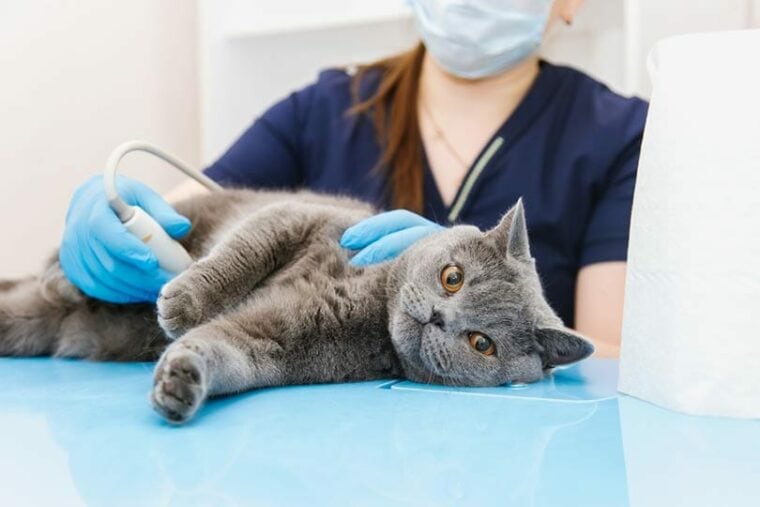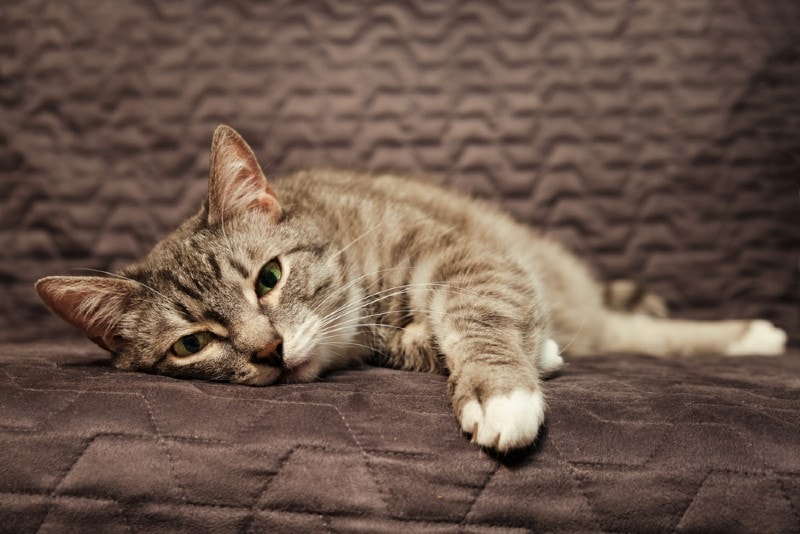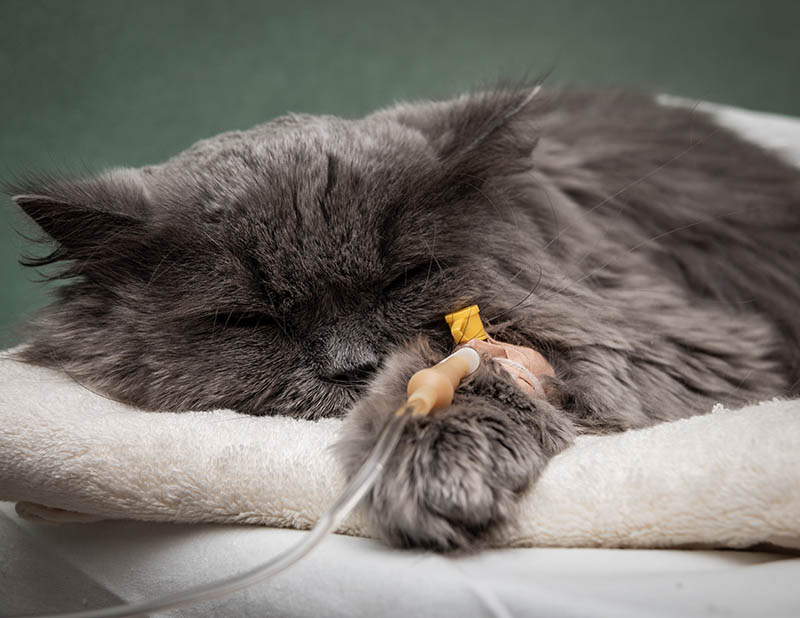
Click Below to Skip Ahead
Pancreatitis in cats is a rare and life-threatening condition. The pancreas is an organ in the abdomen responsible for producing hormones such as insulin, and enzymes that aid in the digestion of food. Pancreatitis refers to an inflamed, angry pancreas, and the cause of this disease is not fully understood. The signs of pancreatitis can be vague or “non-specific”, and although the condition usually arises very quickly, it can become an ongoing or chronic problem.
This article will explore everything you need to know about pancreatitis while answering common questions and disproving common myths.
What is Pancreatitis in Cats?
Pancreatitis refers to inflammation of the pancreas. The pancreas is an organ near the stomach with several very important functions. One of these functions is the production of insulin to maintain normal blood sugar levels. Another function, more pertinent to pancreatitis, is the production of enzymes that break down food. These enzymes are released from the pancreas into the intestines after your cat eats, aiding in the digestion of the meal. Pancreatitis occurs when these enzymes are released prematurely, and thus the enzymes start to “eat away” at the pancreas itself. This results in inflammation, and inflammation results in pain.
At this point, it is worth mentioning that pancreatitis in cats is often seen alongside other diseases. Examples of these concurrent diseases are inflammatory bowel disease (IBD), cholangitis (inflammation of the bile duct system), or diabetes. If diagnostic tests reveal that a cat is suffering from IBD, cholangitis, and pancreatitis at the same time, this has its own special term: triaditis.

What Are the Signs of Pancreatitis in Cats?
The signs of pancreatitis in cats can be vague, and are not specific to pancreatitis; this means that these same signs are seen with other diseases too.
If the pancreatitis is particularly severe, it can result in shock and even death.
What Causes Pancreatitis in Cats?
Unfortunately, the cause of pancreatitis in cats remains largely unknown. While in dogs, pancreatitis is often linked to the ingestion of a highly fatty food, this is rarely the case in cats. It is possible that pancreatitis occurs secondary to another disease—in other words, diabetes, IBD, or cholangitis occurs first, and the inflammatory changes through the body result in pancreatitis.

How Do I Care for a Cat with Pancreatitis?
Pancreatitis in cats requires prompt and aggressive veterinary treatment. Very few cats, if they have mild symptoms and have retained their appetite, can be managed as an outpatient at home with pain relief, frequent meals, and close monitoring. The vast majority of cats will need to be admitted to a veterinary hospital for diagnostic tests and treatment. Treatment of pancreatitis in cats usually involves:
Depending on the severity of the symptoms, and the presence of other diseases such as cholangitis, antibiotics may or may not be required. If cats are believed to have triaditis, other medications to improve the health of the liver and intestines will also be considered.
Once discharged from the hospital, close monitoring at home is important to ensure that the signs of pancreatitis do not occur. Small, frequent meals of a low-fat diet are very important, as is adequate water intake to maintain hydration.
Frequently Asked Questions
1. How is Pancreatitis Diagnosed?
Pancreatitis is diagnosed using a combination of history-taking, physical examination findings, and diagnostic tests. These tests include screening blood and urine tests, as well as specific pancreatic-lipase tests and imaging. Though in people CAT scans are commonly used to diagnose pancreatitis, it is not so useful in our feline friends. Abdominal ultrasound is a very useful tool to visualize the pancreas, as well as the intestines, gallbladder, and other abdominal organs.
2. Do Cats with Pancreatitis Have This Condition Forever?
In the majority of cases, no. Once cats recover from pancreatitis, they can be monitored at home and may never have another “flare-up” of this disease. In some cats, the condition does become chronic, meaning that it persists for a long time, and waxes and wanes in the future. Chronic pancreatitis is more difficult to manage; it can also have long-term consequences, including diabetes and exocrine pancreatic insufficiency. Chronic pancreatitis should be discussed in more depth with your veterinarian.
3. What is the Prognosis for Cats with Pancreatitis?
With early intervention and appropriate treatment, most cats with pancreatitis make a full recovery. Cats suffering from the more severe form of pancreatitis carry a poorer prognosis.
4. Can Stress Cause Pancreatitis in Cats?
No, stress is not an identified cause or risk factor for pancreatitis in cats.
Conclusion
Pancreatitis is a severe and challenging disease. While the cause of pancreatitis is unknown, an inflamed pancreas is very painful and requires veterinary treatment. If you notice signs of vomiting, lethargy, reduced appetite, abdominal pain, or discolored gums, don’t hesitate to contact your veterinarian.
Thankfully, most cats are able to make a full recovery, though some cats experience a chronic form of pancreatitis.
Featured Image Credit: Libre, Shutterstock







